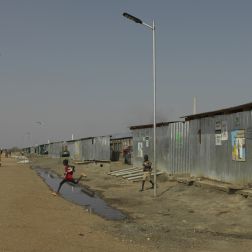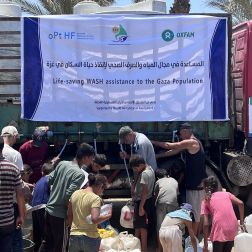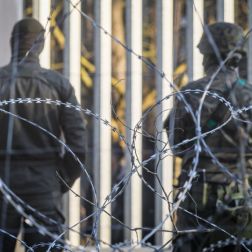- 4 mins read time
- Published: 13th April 2015
Thousands still homeless in Gaza: ‘Our children are paying the price’
For the past six months, Sawsan al Najjar and her family have lived crowded together in a small room with cracked walls and a fragile roof. “I fear the walls will fall on us while we sleep,” she says.
The rest of the house lies in rubble, destroyed by Israeli bombing during last summer's 51 days of conflict between Israeli forces and Palestinian armed groups.
International donors pledged $3.5 billion towards Gaza's reconstruction, yet six months later people like Sawsan are still living in desperate conditions. A new report by Oxfam and other aid agencies including ActionAid, Christian Aid and Save the Children found that not a single one of the 19,000 destroyed homes has yet been rebuilt and promises of lasting political change have not materialised. The eight-year old Israeli blockade of Gaza remains in place, severely restricting the movement of people and goods.

Top: Dr Ihab Dabour checks Sawsan's son Ameer (2) at a mobile clinic in Gaza. The clinic - run by the Palestinian Medical Relief Society (PMRS) and funded by Oxfam - treats illnesses in the devastated neighbourhood of Khuza'a. "Many families are living in extremely unhealthy and overcrowded conditions, in caravans and damaged houses," says Dr Dabour. "There is a shortage of clean water and a lack of heating, which was badly needed during the harsh winter. All this causes frequent illnesses such as scabies and respiratory problems. As long as people live in these conditions, they will continue to have these health problems. I just wish I could help more." "Winter was very tough. The rain leaked through the damaged roof and walls and my children are sick all the time here," says Sawsan. Bottom: Faraj Al Najjar at work. Photos: Iyad al Baba/Oxfam
Sawsan's two young children – Ameer (2) and Ahmed (16) – suffer from stunted growth and her husband, Faraj, works day and night to raise money for their special medical treatment.
“I used to have my own business, trading motorbikes,” says Faraj. “Business got worse after the blockade began [in 2007], but I made enough to at least feed my family. Then during the war I lost the motorbikes, which were worth $7,000. Now I work 12 hours a day fixing spare parts and I barely get 20 shekels [$5/€4.75/£3.40] a day. This is not enough to even buy food.”
Their current living conditions make life even more difficult. “Winter was very tough. The rain leaked through the damaged roof and walls and my children are sick all the time here,” says Sawsan.
Dr Ihab Dabour helped provide emergency health care to thousands of people during the height of the conflict, despite his own home being bombed. Every two weeks he brings a mobile health clinic, run by the Palestinian Medical Relief Society (PMRS) and funded by Oxfam, to treat illnesses in the devastated neighbourhood of Khuza'a where Sawsan lives.
“Many families are living in extremely unhealthy and overcrowded conditions, in caravans and damaged houses,” says Dr Dabour. “There is a shortage of clean water and a lack of heating, which was badly needed during the harsh winter. All this causes frequent illnesses such as scabies and respiratory problems. As long as people live in these conditions, they will continue to have these health problems. I just wish I could help more.”
At least 81 health clinics and hospitals across Gaza were damaged in the conflict – along with schools, water systems and other infrastructure – and most have not yet received funds for repairs. Under the blockade, even the few that have funds have not been able to get essential construction material to start rebuilding.
“The mobile clinic gives us the medicine we need to stop further health problems,” says Sawsan. But what the family needs most is to be able to rebuild their lives. For that to happen there needs to be a permanent ceasefire and an end to the blockade. Gaza needs reconstruction but also help to rebuild its once thriving economy that has been devastated by the blockade and recurrent conflict. 63 percent of young people are now unemployed and people are increasingly reliant on international aid.
“It is our children who are paying the price,” says Sawsan. “We used to have a happy life with a nice house and business – we were not rich, but we didn't need help from others. Now we seek any kind of assistance. We've started to lose hope that reconstruction will ever happen.”
Oxfam and our partners in Gaza are providing safe water, helping families to buy food, and supporting local health services.




